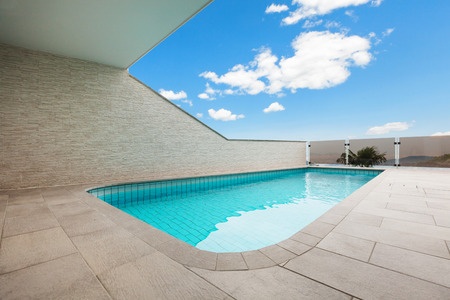 Wouldn’t it be nice if someone could give you an unbiased opinion on the advantages and disadvantages to fiberglass, vinyl liner and concrete pools? Well, you’re in luck!
Wouldn’t it be nice if someone could give you an unbiased opinion on the advantages and disadvantages to fiberglass, vinyl liner and concrete pools? Well, you’re in luck!
Here at Paradise Pools, we want to provide you with honest, reliable information so that you can make informed choices for your household.
In this article, we’ve outlined the pros and cons to each type of pool so that you can get a good idea of which features come with each type of pool.
Let’s get started.
Fiberglass Pools
Advantages
- Low Maintenance. Fiberglass pools require the least maintenance of the three. The solid surface is nonporous, so you don’t have to worry about algae growth and sanitization as much. Also, there is no liner replacement necessary.
- Built-in Features. Fiberglass pools have the option for built-in features such as seating, steps and even tanning ledges.
- Fast Installation. Because the shells of fiberglass pools are constructed off site, installation is fast and easy. Most pools are ready in 3-4 weeks.
- Easy Repairs. If there are any scratches or cracks that occur, the surface can be repaired. You’ll hardly notice anything happened!
Disadvantages
- Limited Design Options. If you’re looking for a custom pool, fiberglass makes this much harder. The shells are constructed from standard molds, making shapes and sizes limited.
- Width Limitations. Fiberglass pools are built and then delivered. Shipping restrictions are no more than 16 feet, which means you can’t have a fiberglass pool wider than this.
- Higher Cost. Fiberglass pools are between $5,000-$10,000 more than a vinyl pool.
Vinyl Liner Pools
Advantages
- Affordable. Vinyl liner pools are the most economical pool choice. You essentially get the same amount of swim space for less than other pool types.
- Customizable. You can choose any shape or size for your vinyl liner pool. There are no limitations. You can even have a certified diving pool!
- Easy Maintenance. The surface of a vinyl liner pool is non-porous, just like fiberglass. This results in less maintenance and lower production of algae growth.
- Simple Repairs. If there is a tear in the vinyl, it can be quickly and easily repaired with no downtime.
Disadvantages
- Liner Replacement. Vinyl liner pools require a liner replacement every 7 to 15 years. This can cost between $3,000 and $5,000.
- Limited Features. Customizable options like built-in seating and tanning ledges are limited.
Concrete Pools (Gunite Pools)
Advantages
- Unlimited Customization Options. The ball is in your court when it comes to concrete pools. Choose any shape, size and depth you want. Or opt for vanishing edges, water features or beach entries.
- Artful Features. Not only can you customize the obvious features of a concrete pool but also build in works of art. Geometric shapes, integrations with your landscaping and colorful stones are all examples.
Disadvantages
- Expensive. Concrete pools are all-around expensive. They cost a lot to install, a lot to maintain and a lot to repair. Concrete pools need to be renovated every 8 to 12 years, and this can cost as much as $15,000 or more.
- High Maintenance. Because the surface of concrete is porous, additional maintenance is required. Not only will you need to monitor algae growth but also add extra acid to counterbalance the pH levels, which rise because of the alkaline pH of the pool.
- Long Installation. On average, it takes 2 to 4 months to build a concrete pool. This is one project that needs to be planned in advance.
We hope that you have found this information helpful! Call Paradise Pools to learn more about installing and maintaining your swimming pool!

 CALL US TODAY!
CALL US TODAY!



